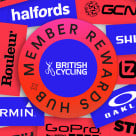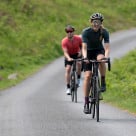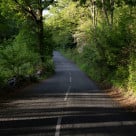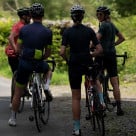Reflections on the Cape, Preparations for the Alps
As we approach the second of our multi-stage MTB races for 2009 - the 8-day Trans-Alps from Mittenwald to Riva del Garda - our preparation has been far from ideal. Jon runs his own cleaning business and has been taking on extra work in what is a very uncertain economic climate, and I've been working overseas for five of the fifteen weeks between the Cape Epic and the Trans-Alps.
Despite this we're fairly relaxed about the 634km and 22,077m of climbing that awaits us in the Alps, both because we've put in some hard training and racing in the time we've had available and because we'll be treating the Trans-Alps as an "overload" training week. When we return from Europe there will be just two weeks before we head off to Canada for the Trans-Rockies, so we need to come out of the Alps in good shape.
Work commitments aside, training at this time of year is much easier than during the winter months when we prepared for the Cape Epic. With long summer days it is so much easier to find time to train, and so much more enjoyable to ride a bike. For British riders, the Cape Epic comes at the worst time of the year - the end of March - at least in terms of preparation. Many British riders we spoke to out in South Africa said that finding the time and the motivation to train when it is cold, wet and dark was especially difficult. But as the old saying goes, there's no such thing as the "wrong kind of weather, only the wrong kind of clothes". Wrap your extremities in Sealskins and you can survive any winter weather. And as you pedal along, just think about a week's spectacular riding in the African sun - that should be all the motivation you need during the cold winter days.
There's no substitute for time on the bike when preparing for a multi-stage event, which in the winter can mean a lot of early starts before dawn if you want to accumulate the kilometres and still enjoy some semblance of family life. Long, low intensity training rides can be rather boring after a while, especially if you're riding alone. Prior to Christmas our training also involved numerous shorter spinning sessions on the road and at least one MTB ride each week, with the aim of developing our technical skills for the challenges ahead. We also worked on our "core strength" - pilates proved to be great fun, as did work with a fitness ball. In the New Year our focus switched to climbing and explosive work, with an overload week in February to ensure that our bodies were prepared for eight consecutive days of riding. We also concentrated on nutrition and recovery during this period, with support and advice from High5 and Skins.
Having short-term goals incorporated into a longer-term training plan is a great way to stay motivated. Having a training schedule is a necessity, not a luxury. Our training schedule is carefully prepared by George Rose (University of Wales, Newport) who knows a thing or two about riding a bike. Equally important, George has taken the time to get to know about us - what makes us tick and how much time we have to train - which means that our training schedules reflect what we need to do and what we can do.
The final stage of our preparation for the Cape Epic involved a "King-cycle" test to determine our maximum heart rate, power output and VO2 max. This would allow us to ride at a comparable heart rate during the races as all team riders must stay within 2 minutes of each other at all time. Riders who are separated by more than 2 minutes from their team partner at any point in the race receive a Separation Time Penalty (STP) of 1 hour. Team rider separation can be measured at the start, at the finish, and at various official check points, but can also be enforced at any point during the race. Three STPs result in the disqualification of the team.
Unfortunately, Jon was unable to complete the final King-cycle test because of a stomach bug during the week before we flew out to South Africa. This had two important consequences. First, it was more difficult to judge each other's pace/heart rate during the race without the final test results. Secondly, Jon was not fully recovered from the stomach bug and this proved to be a contributing factor to the problems we encountered on Stage 4 of the Cape Epic.
Our strategy for the Trans-Alps will be much simpler - we will ride to Jon's heart rate for the first four days. After that, once fatigue sets in, heart rate readings are more difficult to compare, so we plan to use a technique recommended by one of the Polar representatives supporting the Cape Epic. If our level of fitness and performance starts at "ten" on day one, then we will use a scale of one-to-ten to keep each other informed of how we feel as the race progresses. In addition, George is preparing daily evaluation sheets that we can use to reflect on our performance on each stage, which we will complete independently and then "compare notes" to determine how hard (or easy) we should ride the following day. We'll keep you posted on our "marks out of ten" in our daily race reports from the Trans-Alps.
Pete & Jon's sponsors:
www.skins.net | www.cube-bikes.co.uk | www.bentleybirmingham.co.uk | www.mulebar.com | www.highfive.co.uk | www.camelbak.com | www.udderlysmooth.co.uk | www.thecyclestudio.co.uk |Gateway Cycles




